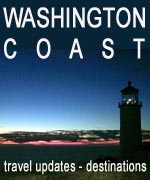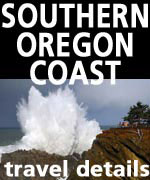Sunday's Fall Equinox and the Bizarre to Sad Science of Sunset on Washington / Oregon Coast
Published 9/21/24 at 5:55 p.m.
By Oregon Coast Beach Connection Staff
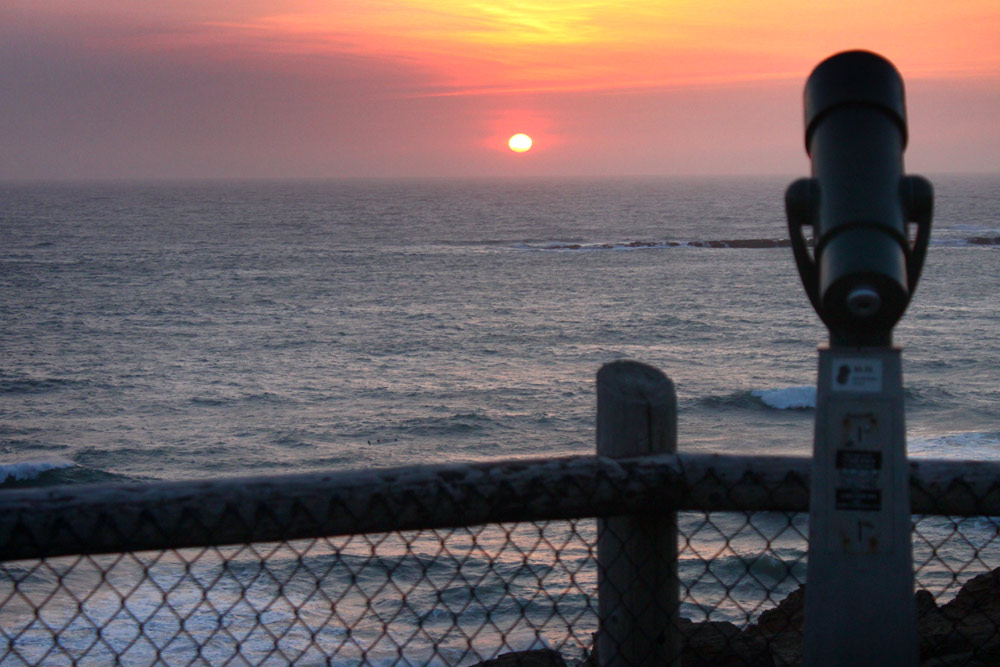
(Depoe Bay, Oregon) – If you're out on the beaches on Sunday you may want to note exactly what time the sun goes down. And if you're up just before 6 a.m., you may want to take note of 5:43 a.m. right on the dot. (Above: Cape Foulweather, near Depoe Bay / Oregon Coast Beach Connection)
Why?
Includes exclusive listings; some specials in winter
In Cannon Beach:
Includes rentals not listed anywhere else
In Manzanita, Wheeler, Rockaway Beach:
Some specials for winter
In Pacific City, Oceanside:
Some specials for winter
In Lincoln City:
Some specials for winter
In Depoe Bay, Gleneden Beach:
Some specials for winter
In Newport:
Look for some specials
In Waldport
Some specials for winter
In Yachats, Florence
Some specials for winter
Southern Oregon Coast Hotels / Lodgings
Reedsport to Brookings, places to stay; winter deals
Both are related in the region of Oregon / Washington, and especially out on the Oregon coast or Washington coastline. That sunset on Sunday is the first sundown of fall. This also means Saturday's sunset – if you're out in places like Westport, Bandon, Newport or Seaside – is the last one of summer. It also marks another milestone for sunsets that's rather sad, and it opens up a whole kind of science that may be new to you: how sunset is actually a projection from below the horizon.
Sunday, September 22 is the fall equinox, the morning that summer calls it quits. It officially changes season at 5:43 a.m., according to Jim Todd, astronomy expert with Portland's OMSI.
“In the Northern Hemisphere, the date marks the end of summer and the beginning of autumn when the days will start getting shorter and the nights longer,” Todd told Oregon Coast Beach Connection. “This is the moment in time when the Sun’s rays are directly over the equator and the days are nights are nearly equal in length. The Sun’s rays continue to make their journey south, so hours of darkness will be longer than daylight. This is why it's called an 'equinox,' a Latin word meaning 'equal.' “
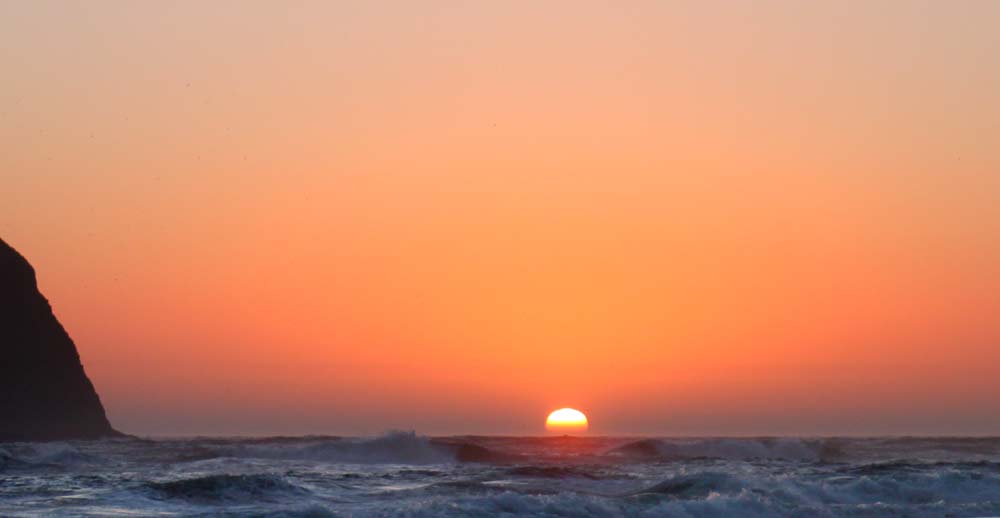
Yet there's a weird little trick happening here. The sun's rays may be directly overhead, and they hit the Portland / Oregon / Washington area with an equal 12 hours of daylight and 12 hours of nighttime. But thanks to a freaky little quirk of our atmosphere that's not what we see.
Exact sunset times will differ along the Washington coast and Oregon coast as you go north or south, and they'll be different a ways inland in areas like Seattle or Bend. Yet for example, Todd used Portland's sunrise and sunset times. Those two don't happen exactly 12 hours apart here on the 22nd – and that's true of many locales around the world.
See Washington Coast Weather - Oregon Coast Weather - Inland Oregon Weather
“In reality, September 25 day and night are both very close to 12 hours from Portland, Oregon – sunrise at 7:01 a.m. and sunset at 7:02 p.m.,” he said. “At the 45th latitude North, the time it takes for the sun to fully rise and set, which is several minutes, is added to the day and subtracted from the night, and therefore the equinox day lasts a little longer than 12 hours. Another reason why the day is longer than 12 hours on an equinox is that the Earth's atmosphere refracts sunlight.”
Indeed, the 45th latitude runs very close to Cascade Head on the central Oregon coast, and close to Neskowin.
That last factor of refraction is a big one, and it's doing something very strange to those sunsets you see on the Oregon and Washington coastlines. It turns out, sunset is an actual projection: it does not happen when you see it. Because of the Earth's curvature and the atmosphere the light must travel through, we're seeing it two whole minutes after it went down.
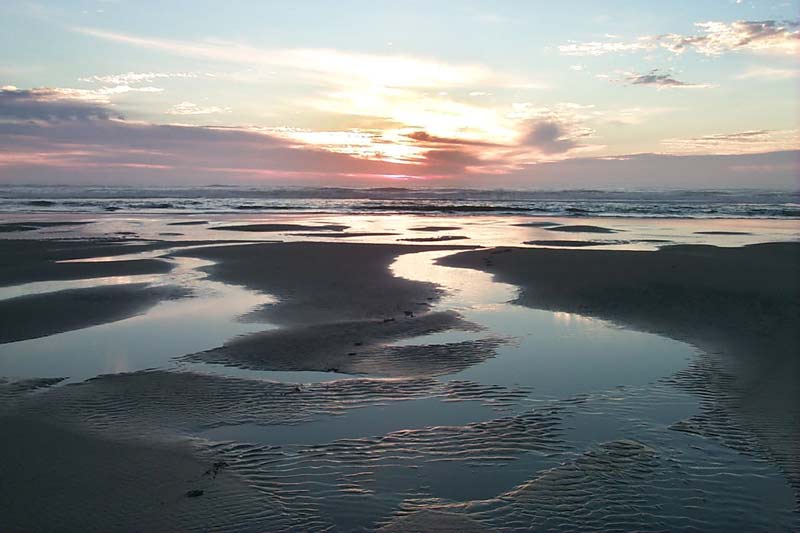
Ilwaco, Washington Coast / Oregon Coast Beach Connection photo
Astronomer Neil deGrasse Tyson went into this on his podcast / video series Star Talk. See the video
“The light through the vacuum of space moves at the speed of light,” Tyson said. “When it goes through Earth's atmosphere it's no longer moving at the speed of light. It slows down. Anytime time light slows down, coming at an angle into a medium, the path of light bends. The physics term for that is refraction.”
Refraction is obvious in everyday things like a straw in liquid, he explains. Look down into the straw and you can see light is bent because the liquid is denser than air. The straw will appear to be bent as you look inside.
Our atmosphere does the same thing with sunsets. Then, the curvature of the Earth actually allows more bending. That sun you see at Cannon Beach, Long Beach, Port Orford or Manzanita went down at least a couple of minutes earlier before you see it happen.
“As the sun approaches the horizon to set, it's actually moving faster than you see it to be,” Tyson said in the video. “So refraction is taking the sun lower than the actual position in the sky you think the sun is. When the glowing sun is on the horizon, the sun has already set.”
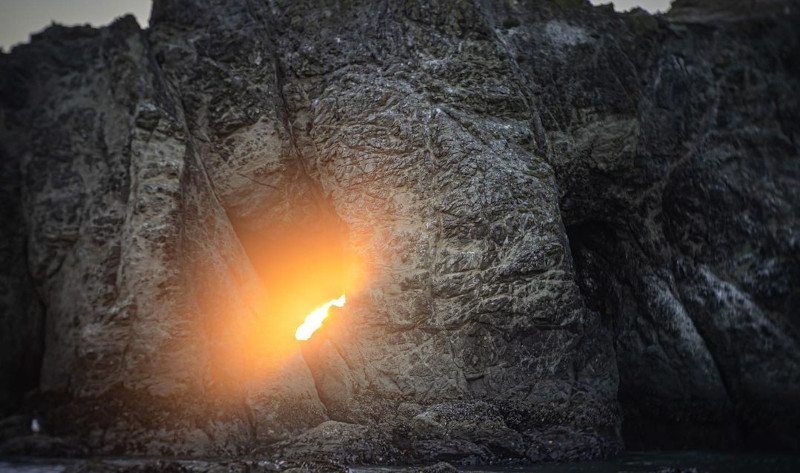
Bandon's Elephant Rock - courtesy Manuela Durson - see Manuela Durson Fine Arts
Add to that the fact sunlight takes 8 minutes to reach us from the sun and you've opened up yet another can of astronomical worms.
A sad aspect of Sunday's sunset is that it's the last one after 7 p.m. until spring. From here on out, as days get shorter, sundown keeps dropping farther and farther towards the earliest sunset of the year: the winter solstice.
That number is for the Portland area, however. Some parts of the Oregon coast and Washington coast will still get sunset past 7 p.m. for a couple of more days – because sunsets happen later out there than they do inland.
Oregon Coast Hotels for this event - South Coast Hotels - Oregon Coast Vacation Rentals - Where to eat - Maps - Virtual Tours
Cannon Beach Lodging
Nehalem Bay Lodgings
Manzanita Hotels, Lodging
Three Capes Lodging
Pacific City Hotels, Lodging
Lincoln City Lodging
Depoe Bay Lodging
Newport Lodging
Waldport Lodging
Yachats Lodging
Oregon Coast Vacation Rentals
Oregon Coast Lodging Specials
More About Oregon Coast hotels, lodging.....
More About Oregon Coast Restaurants, Dining.....
 Andre' GW Hagestedt is editor, owner and primary photographer / videographer of Oregon Coast Beach Connection, an online publication that sees over 1 million pageviews per month. He is also author of several books about the coast.
Andre' GW Hagestedt is editor, owner and primary photographer / videographer of Oregon Coast Beach Connection, an online publication that sees over 1 million pageviews per month. He is also author of several books about the coast.
LATEST Related Oregon Coast Articles
Flooding Shuts Down Roads in Washington, Oregon, CoastRoad issues at Seaside, Neskowin, Hwy 6, SW Washington and more coming. Weather
Yachats Mushroom Treasure Hunt Returns to Wilds of Oregon Coast Forest Trails
On the trails between Yachats and Heceta Head through February 28. Yachats events
State Parks Dept Wants Input on New Drone Rules for Inland Oregon, Coast
Public input: rules would affect where drones can take off, land. Safety
Oregon Coast Traffic Work: Astoria, Depoe Bay and a Different Part of Highway 6
Astoria-Megler Bridge next year, Depoe Bay and OR 6 now
Oregon Coast and Washington Coast Beach Safety - the Complete Guide, Alerts, ...
Advice and guidelines for Washington and Oregon: what to look out for
N. Oregon Coast's Highway 6: Why It Was Abruptly Closed for the Day This Weekend
A new roadway arose with more sunken asphalt. Traffic
UPDATE: Manzanita Declares State of Emergency After N. Oregon Coast Rains Beg...
Heavy rains saturated city-owned property, has begun to move. Weather
N. Oregon Coast's Highway 6 Back Open to Two Lanes After Month-Long Traffic I...
Road is repaved and both lanes to and from Tillamook are open
Back to Oregon Coast
Contact Advertise on Oregon Coast Beach Connection
All Content, unless otherwise attributed, copyright © Oregon Coast Beach Connection. Unauthorized use or publication is not permitted





